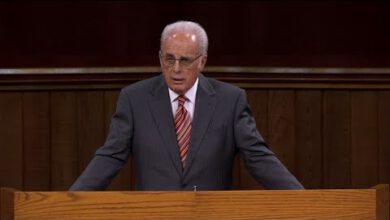The Terrors of the Great Tribulation, Part 1 (Luke 21:20-24)
Let’s open our Bibles to Luke 21, where we encounter profound words from the Lord Jesus Christ that introduce a significant topic: the future prophecy regarding the end times. Talking about end-time prophecies is a vast subject, covering Old Testament books that point toward the future, as well as New Testament messages from Jesus and writings by the apostles that discuss the end of the age. Additionally, the Book of Revelation offers a series of visions John the Apostle received while exiled on the island of Patmos, focusing on the conclusion of human history.
In a general sense, the end of human history has already been written. There are no surprises to God or those who understand His revealed Word. God, in His Scriptures, has provided an understanding of the end times for those who take His Word at face value. In Luke 21, Jesus Himself gives a message to His disciples about the future.
This takes place at an ironic moment—on the Wednesday of Passion Week, just days before His crucifixion. It is at this point, when the people of Israel and its leaders have rejected Jesus as the Messiah, that He walks out of the temple with His disciples, sits on the Mount of Olives, and shares the future with them. In the midst of their rejection of Him, He speaks of what only God can reveal: the future.
Jesus describes history’s unfolding, from the present moment to the final culmination—His own return in glory, as mentioned in verse 27 of Luke 21. The irony is clear: those who reject Him as God are confronted with the one who not only knows the future but, as the Creator of the world, will bring history to its conclusion.
What Jesus reveals about the future is truly tragic. According to Him, the world and its inhabitants face a far worse fate than anything environmentalists, scientists, educators, politicians, or religious leaders could ever imagine. We are not heading toward a utopia or an age of peace and tranquility. The world is already difficult, and it will only become harder until it reaches a point worse than anything we have known.
All of history has been a struggle against the effects of sin and the curse it has brought upon humanity and creation. Jesus said He would die, rise again, pay the penalty for sin, and then leave. While He is gone, things will worsen. In verse 8, He warns, “See to it that you are not misled. Many will come in My name, saying, ‘I am He, and the time is at hand.’ Do not follow them.”
Between His first and second comings, the period in which we now live, there will be widespread deception. False Christianity will outnumber true Christianity. False representatives of Christ will rise, and the deception will grow, culminating in the Tribulation, a time of great apostasy before Jesus returns. This is a period marked by escalating religious deception, which we can clearly observe today.
Secondly, our Lord warned of inevitable disaster. In verse 9, He says, “You will hear of wars and disturbances.”
